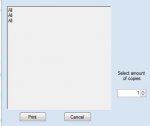Ok here is what I have:
2 forms, on the first form I have a listbox which recieves it's items from a datagridview, when I click on a button all the items (in the listbox) are converted to a string and add to a richtextbox on the second form.
On the second form I have also a numericupdown, and here is what I run into.
With the numericupdown I want to multiply or remove blocks of strings from the richtextbox.
For example, when clicked on the button (form1) a string is add to the richtextbox, when I click (on form2) on the upbutton of the numericupdown I want to add the same string again below the existing one with 2 blank lines between them (this can be down a lot of times).
When I click the downbutton, a string should be removed.
In short term, the amount in the numericupdown should be the amount of string blocks in the richtextbox.
Here is the code I use to copy listbox.items to string and add them to the richtextbox:
Thanks
2 forms, on the first form I have a listbox which recieves it's items from a datagridview, when I click on a button all the items (in the listbox) are converted to a string and add to a richtextbox on the second form.
On the second form I have also a numericupdown, and here is what I run into.
With the numericupdown I want to multiply or remove blocks of strings from the richtextbox.
For example, when clicked on the button (form1) a string is add to the richtextbox, when I click (on form2) on the upbutton of the numericupdown I want to add the same string again below the existing one with 2 blank lines between them (this can be down a lot of times).
When I click the downbutton, a string should be removed.
In short term, the amount in the numericupdown should be the amount of string blocks in the richtextbox.
Here is the code I use to copy listbox.items to string and add them to the richtextbox:
VB.NET:
Public Sub SGLists()
Dim i As String
For Each i In Me.ListBox1.Items
printsonglist.RichTextBox1.Text = printsonglist.RichTextBox1.Text + i.ToString() & Environment.NewLine
Next
End Sub
Private Sub ButtonItem22_Click(ByVal sender As Object, ByVal e As System.EventArgs) Handles ButtonItem22.Click
SGLists()
printsonglist.ShowDialog()
End SubThanks

